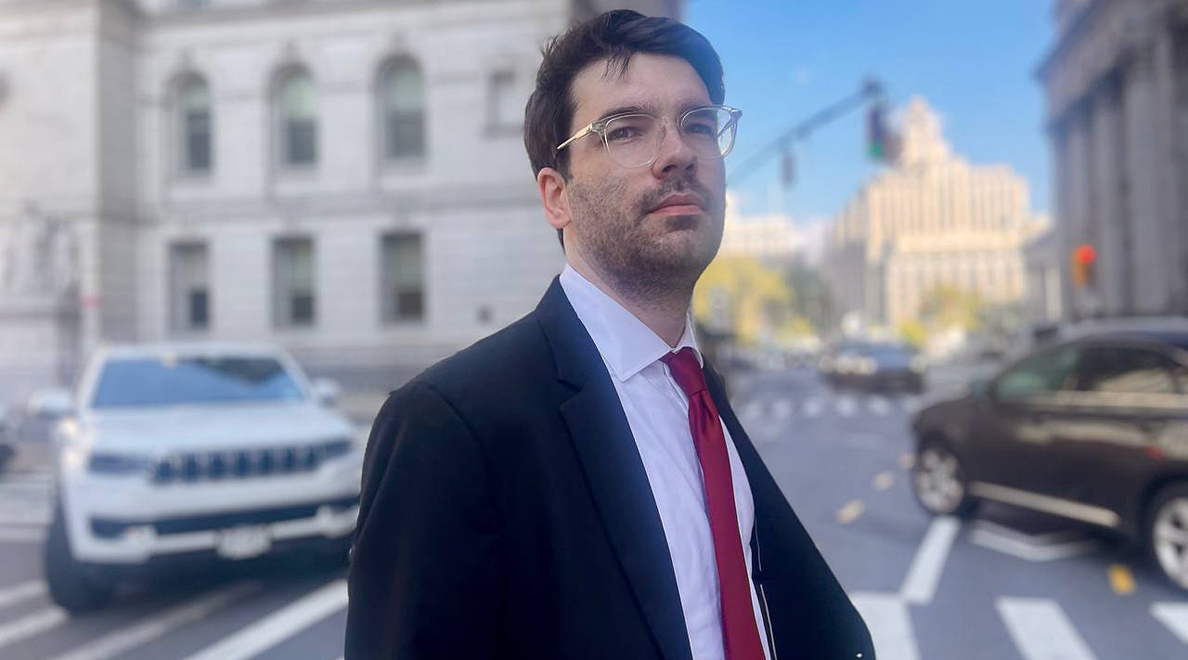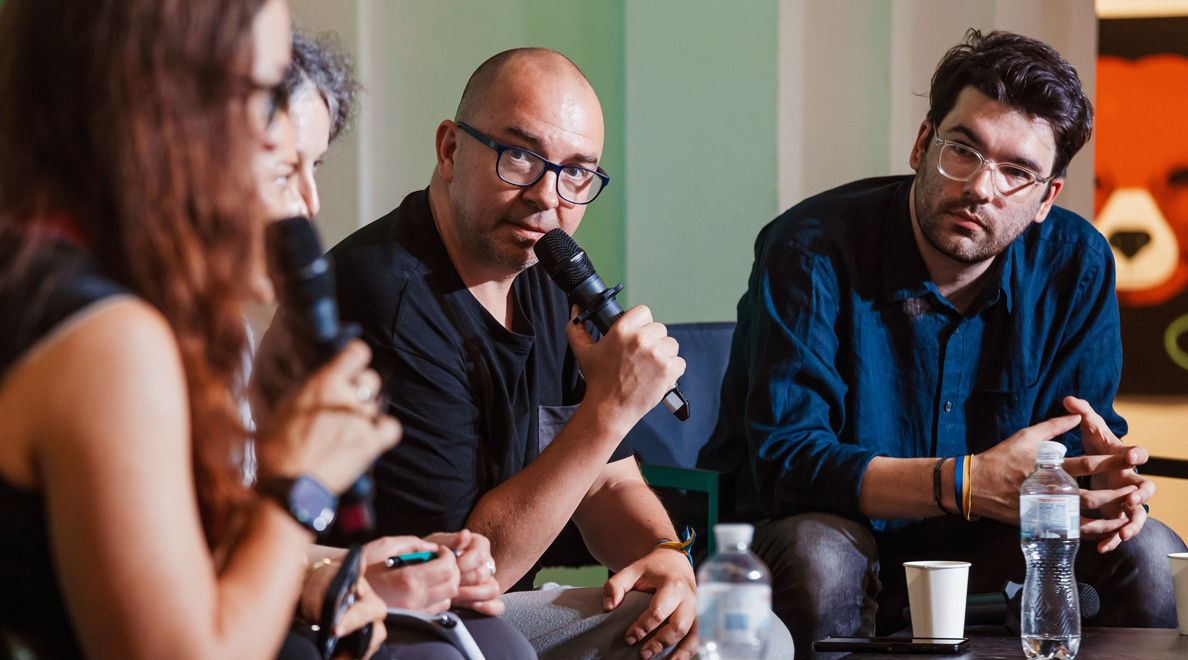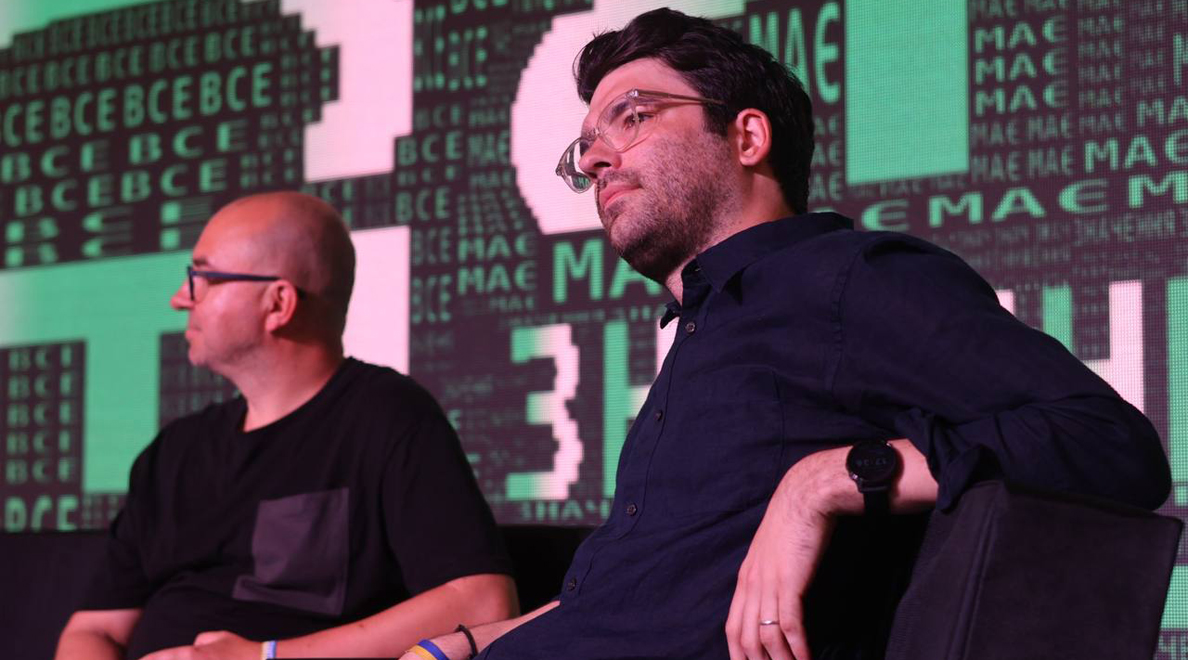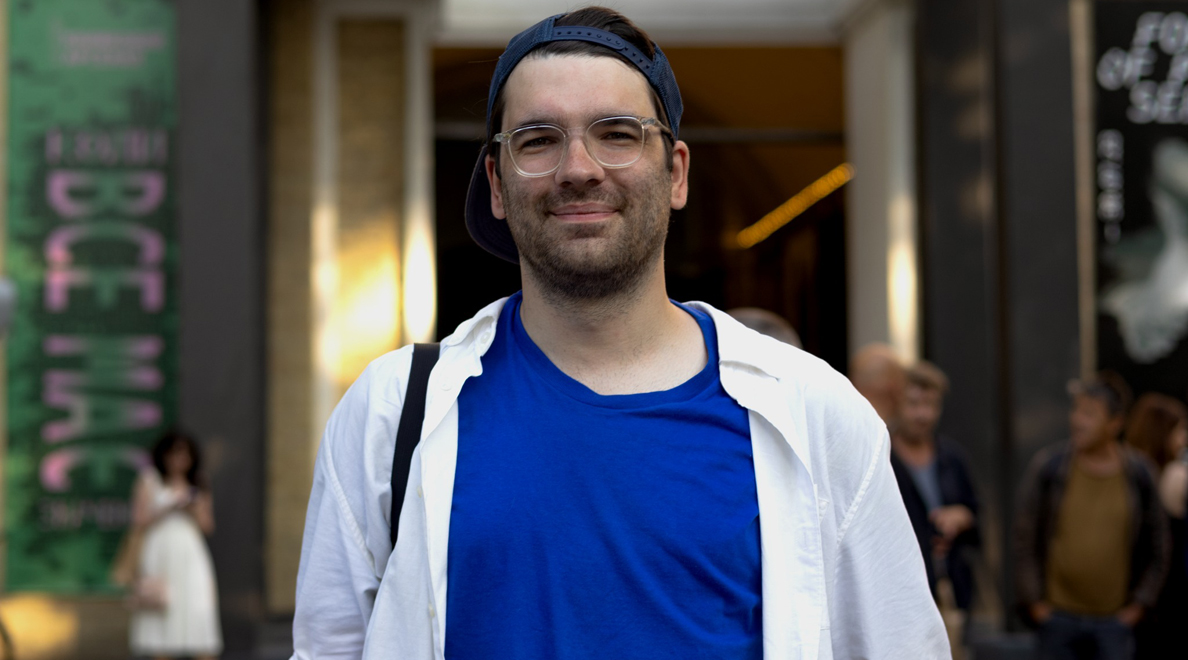Texan Christopher Atwood has been researching the politics of post-Soviet countries for years and recently narrowed his focus on the issue of Russia’s genocide against Ukrainians. He works with leading genocide researchers and several NGOs, including the local volunteer-driven organization Razom for Ukraine. Together with other experts and researchers, he has prepared reports on Russia's genocidal actions in Ukraine. His goal, as he puts it, is to "help people understand that the full-scale Russian invasion is a violation of the Convention on the Prevention and Punishment of the Crime of Genocide, adopted in December 1948 at the UN General Assembly."

RUSSIAN NARRATIVES ABOUT UKRAINIANS HAVE ALWAYS CONTAINED GENOCIDAL OVERTONES
– Christopher, you deal with the issue of the genocide of Ukrainians by the Russian Federation, but why are you interested in this topic?
After I finished university, I moved to Ukraine, but then I also lived for some time in Russia. I spent time in Moscow and Yekaterinburg, in Kyiv and Donetsk. So I've lived in the capitals of both countries, I've lived in regional cities in both countries. And as I spent more time in Ukraine, I started to understand some of the dynamics and tensions that have historically existed with Russia's relationship with Ukraine, and that some of the narratives coming out of Russia were not reciprocated by Ukrainians.
For example, Russians would say negative things about Ukrainians or make these very wide-sweeping generalizations about Ukrainians. But Ukrainians wouldn't necessarily do the same thing about Russians individually, rather the issue would be with Russian systems of rule or Russian domination of the region.
So, when the full-scale invasion took place, it was immediately apparent that there was a really dark undercurrent to the rhetoric that was happening, leading up to the war.
I lived in Donetsk for a year in 2011. So when everything happened in 2014, and in subsequent years, it has always been very, very close to me. I've always been very curious to understand why Russia was so interested in occupying Donetsk, Luhansk, Crimea, Kharkiv, Odesa, and, you know, all of Ukraine. Between my experience with both countries, both cultures, both systems, and then seeing what Russia had been doing since 2014, to me, the first question was, “is this a genocidal war?” And the immediate answer was, "probably, it is." From there, I was lucky enough to find myself among leading experts in the field, working on reports to make a determination on a legal basis, not just on an intellectual or moral basis.
– You must have met the historian Tim Snyder, who is also interested in the Russian genocide in Ukraine…
I met him on a couple of occasions when we did our initial report. Professor Snyder is listed as one of the contributors to that report. My role was very much as a regional, to a certain extent, cultural and linguistic expert. So I could understand Russian, I can understand Ukrainian, I can understand and interpret the narratives so that our international human rights lawyers could then make a determination on whether those narratives rise to the level of incitement to genocide. Part of my job was to be in touch with leading experts around the world who know the region in particular, not just international human rights lawyers. So I reached out to Timothy Snyder, to talk about the report, and get his input.
And I've talked to a lot of other similar people. I don't have a particularly close relationship with Tim Snyder. But I have spoken with him specifically about this topic on a couple of occasions.
THE THREAT OF GENOCIDE AND INCITEMENT TO IT IS ALSO A CRIME
– What do you think exactly gives grounds to believe that Russia is committing the crime of genocide?
So there's a handful of ways to interpret genocide, but the general idea is that you're trying to destroy a people. But there's also the very narrow legal definition of what genocide is. The Convention on the Prevention and Punishment of the Crime of Genocide prohibits several genocidal acts and other crimes. The Genocide Convention does not only outlaw the crime of genocide, it outlaws other things, including incitement to genocide. So, for example, going out in public as a political, military, or cultural leader, and saying, to a large crowd, “You guys need to go and murder all of the members of this protected group.” Even if that crowd does not go and murder all of that group, you're still inciting genocide.
So, from a legal perspective, the first place to start is with the Genocide Convention. The definition of genocide is contained in Article 2. But, in Article 3, there are five illegal acts that shall be punishable: genocide itself; conspiracy to commit genocide; direct and public incitement to commit genocide; attempt to commit genocide; complicity in genocide.
Each of those five acts is outlawed and forbidden by the Genocide Convention.
When we're talking about the Russian case in Ukraine, we have to start with all of these acts that are forbidden. And the one that is most obvious and the easiest to prove, especially to a Western audience, is Russia's direct and public incitement to commit genocide.
When you watch Russian state news or read Russian state newspapers, the rhetoric is beyond reprehensible. It's beyond horrifying. It is directly genocidal. Publications in Russian state media are direct incitement to genocide, saying that Russia must destroy Ukrainians.
For example, they compare Ukrainians to insects, suggesting that the "special operation" is kind of a cleansing. That kind of language is directly genocidal when you are comparing an entire people to insects and suggesting that you must cleanse the insects. That is directly genocidal.
So there is no real way to defend that kind of rhetoric, especially when you combine it with the actions of Russian soldiers, or when you combine it with the way that Russia conducts its occupation of Ukrainian territory.
We've seen evidence that, when Russian soldiers have been entering an area, they've been instructed to just kill civilians. There is plenty of evidence that Russian soldiers act on the basis that, if you are Ukrainian, you can be destroyed. So, for me, that's the number one thing, the incitement to genocide, because those soldiers are acting on the rhetoric of the state apparatuses that exist in Russia. It's state media, its politicians, it is military leadership. It’s even religious leadership. And I think that is the biggest, most obvious indicator that Russia is at least attempting genocide in Ukraine.
We wrote our most recent reports that we published in July this year. We examine each of the five crimes of genocide under Article 2 of the Convention: killing members of the group; causing serious bodily or mental harm to members of the group; deliberately inflicting on the group conditions of life calculated to bring about its physical destruction in whole or in part; imposing measures intended to prevent births within the group; forcibly transferring children of the group to another group.
The forcible transfer of children is the other most straightforward argument to use to convince people in the West that Russia is committing genocide in Ukraine.
When you show them the rhetoric Russia is using, when you show them the specific rhetoric they have about Ukrainian children, and then when you show them the actions that Russia is committing against those Ukrainian children, then it is a very open and shut case for a lot of people to say that this is genocide.
And, in my in my work with Razom, I helped their advocacy team for a while. I helped coordinate their response to trying to get recognition from different public figures that the full-scale invasion is genocide. And the most effective means to help people understand what is really happening in Ukraine was showing them the rhetoric and the crimes against children. And that kind of messaging resulted in several prominent American public figures and politicians recognizing the full-scale invasion is genocide. It's just a message that helps clarify the situation for a lot of people, I think.

– The UN Independent International Commission of Inquiry on Ukraine could not find enough evidence that Russia is committing genocide against Ukrainians. Why do you think that is?
– I suspect there are a few things going on there. There are political considerations that go into that kind of determination. The UN bodies don't want to alienate Russia, they view Russia as a partner. The other potentially cynical view is that there's hope in the West; they want to support dialogue between Ukraine and Russia. And if they recognize the full-scale invasion as genocide, then it harms the chance for peaceful dialogue. Of course, the problem with that logic is that it ignores Ukrainian existence and assumes that Ukrainians are going to be okay with talking to Russia.
On the other hand, the UN as a body understands its role and the weight of its words. To come to a full understanding of genocide or a full recognition of genocide, it takes a lot of work. I think you could make a reasonable argument that without access to all of the cases in the Ukrainian Prosecutor General's Office of the crimes against individual Ukrainians, some sense of hesitancy might be warranted.
But, in my view, this hides behind the idea that courts haven't determined that genocide is taking place in Ukraine. But that's irrelevant.
If you look at our first report that we published last year, we came to the same conclusion. Our first report was international news, it was on the front page of The New York Times. But our actual conclusion was that Russia is, number one, in violation of the Geneva Convention for incitement to genocide. But incitement to genocide does not mean genocide is taking place. It means that there is a system in place to promote and provoke genocide.
We also concluded that there was a serious risk of genocide. This is the key factor, the Genocide Convention is on the prevention and punishment of genocide. Prevention literally comes first in the name of the document. The goal of the Genocide Convention is first to prevent genocide, and then to punish it.
We all have a moral obligation to recognize genocide, but states have a legal obligation under the Genocide Convention to do everything reasonable in their power to prevent genocide. And I think, that is the biggest problem, that they don't recognize the seriousness and the risk.
– If we compare this genocide with other genocides known in history – the Holodomor, the Holocaust, Hutus against Tutsis in Rwanda, Srebrenica in Bosnia, Uighurs in China – what is common and what are its peculiarities?
Typically, we see in genocides that the party committing genocide wants to hide the fact that they're committing genocide. They don't want people to see it. They want to make it so that it is not so obvious. They want to say, “No, we're not committing genocide.” Usually, people committing genocide don't act so brazenly.
But what Russia is doing is so openly genocidal. When you watch Russian state television, inevitably, somebody starts going off on a rant about how Ukraine must be destroyed. When we worked on the second report, we had to stop ourselves from continuing to dig down different holes, to pull out more sources to add more context, because there was just too much information. It's so overwhelming. There's just so much evidence of it. There are so many testimonials. So much of it is on video.
From that aspect, I think that is kind of the most disturbing and remarkable part of this entire invasion, unfortunately.
– You have been to Ukraine during the war, please share your impressions.
You can feel that people know that they're living through a historic moment. And that they're living their everyday lives with an additional added weight. There's this feeling of “we know what we're facing, we know that this is existential for us, but we don't care, we're going to continue working, we're never going to relent,” which is incredibly remarkable.
Last year, I visited the Kyiv Oblast just a few months after it was liberated. I had the opportunity to sit down with locals from Irpin and Bucha and talk about what had happened. Immediately, I felt an obligation to help bring those Ukrainian perspectives, voices, and experiences to whatever audience I could, particularly in the US.
So, more or less, my impression has been that I'm inspired by the bravery and the resistance. I’m inspired by all of the little things people are doing. From the smallest act of someone switching their iPhone language to Ukrainian or English from Russian, so much is done intentionally as an act to resist Russia’s attempts to destroy Ukrainian culture and identity. And that is very, very inspiring.

CONCRETE STORIES ABOUT RUSSIAN ATROCITIES WILL BEST CONVINCE THE WORLD COMMUNITY
– What needs to be done for the international community to recognize Russia's actions as genocide?
I think there needs to be a coordinated effort to point to the atrocities that are happening. In the West, people love to talk about weapon systems or specific policies. People love to talk about NATO membership. And all of those things have their place and are important. Yes, we do need to constantly stress that Ukraine needs every weapon system available to make sure that the counteroffensive is maximally successful. Ukraine needs to know for certain that it has a place in the West. And the two best ways to indicate that are to ensure NATO and EU membership.
But lawmakers love those conversations. Because they’re abstract. If we're speaking with lawmakers or public intellectuals, then I think the most effective way to leave a lasting mark is to shift the conversation and point to what Russia is attempting with regards to the full-scale invasion, and the atrocities that Russia is committing.
In our most recent report, we cited an example of a Ukrainian girl who was sent to a camp in occupied Crimea. And she had a sweatshirt with the words “Slava Ukraini” on it. And the guards told her to cut it. When she refused to cut it, they cut the sweater themselves. They destroyed her sweater like they wanted to destroy Ukraine, at least on some level, in her mind.
When you can share those kinds of stories with a Western audience, then you'll start to see a reckoning, one with the atrocities that Russia is committing, but then two, with the overarching role of Russia in the region, the role of Russian colonialism, imperialism in Ukrainian history. This all necessarily forces states to seriously engage with the discussion of genocide.
I think that, ultimately, all of these things are fundamentally connected. States understand that Russia is committing genocide in Ukraine, but in order for them to admit it, they need to reckon with their perception of Russia in general. They need to understand that Russians are capable of this. And we have an obligation and a duty to ensure that the future of Europe is one where Russians do not get to carry out these kinds of atrocities without any repercussions.
NOT ONLY PUTIN SHOULD BE PUNISHED, BUT ALSO THE RUSSIAN STATE
– What should be the punishment for the perpetrators? Can it happen that Russia gets away with it?
First, let me say I believe that I hope Putin and his collaborators get whatever the maximum punishment under international law might be. With that said, I tend to agree with the international human rights lawyers that I've worked most closely with on this question. And they've said this publicly, I think, a lot. They want to focus on state responsibility, far more than personal responsibility. Because, in their view, if Putin gets overthrown and goes to The Hague, there’s no guarantee you’re going to rebuild Ukraine.
I agree that the most important thing has to be state responsibility because Putin's entire full-scale invasion is rooted in Russian colonial narratives. It's rooted in Russian imperial ambition. It’s rooted in these larger, more philosophical concepts.
I think the Genocide Convention is the best way legally to understand Russia's invasion of Ukraine. But, on an intellectual level, it's far deeper the countless acts of genocide we’ve seen during this particular full-scale invasion. We have to remember, the act that Russia has been attempting to destroy Ukrainians, dating back to the Russian Empire, to policies like the Ems Ukaz. These acts have been intended to destroy Ukrainian culture and Ukrainian identity from the beginning.
Russia has always perceived Ukrainians as a threat. So I think that in terms of a punishment for this genocide, the Russian state must take full responsibility. There has to be a full cultural reckoning within Russia. Russians have to fully reject the imperial and colonial undertones of the contemporary Russian project, the contemporary Russian state, contemporary Russian culture, and contemporary Russian identity. Russians have a lot of work to do.
My fear is that, if we allow individual perpetrators to take away the burden from the Russian state or the Russian political project, then we are doing a disservice to not only Ukrainians, but to all of the peoples who will bear the consequences of allowing Russia to continue existing with an intention to destroy its neighbors. Russian colonialism and imperialism do not start or end in Ukraine. Russia would love to destroy a lot of other peoples that are around it and inside it. And so, in order to prevent that, you have to squarely place responsibility on the state, on state apparatuses, and on Russia as a concept.

– Putin is hoping for a change of power in the United States, and Russian Defense Minister Sergei Shoigu has said that the war will last until 2025, clearly implying that the next US president will change his approach to supporting Ukraine. How does American society view this prospect?
– The vast majority of Americans support Ukraine unequivocally. Americans recognize that Russia is committing war crimes in Ukraine. 68% of Americans believe that Russia is attempting genocide in Ukraine, that is 85% of Democrats, 58% of independents, and 55% of Republicans. Even a majority of Republicans, whom Russia is most targeting right now with disinformation and propaganda, believe Russia is committing genocide in Ukraine.
We’ve seen that Russia’s attempts to support one candidate over another have had mixed results. It doesn't always work out how they want it. Biden was not Russia's preferred candidate in the previous election. So it's not a guarantee that they can get the person that they want elected. That's the first main point.
But the other main point is that, when Trump was elected in his first term, he was unable to change the course of American foreign policy. He was able to slow it, he was able to be a nuisance, and he was able to cause our allies to question our commitment to democracy and to our own allies. But it wasn't enough to fully change the course of our political process. So I think it is hard to project what exactly a Trump presidency would mean for Ukraine and for the war.
It's also important to note that, when you speak to Republicans in DC, to policy experts who happen to be Republican, unequivocally, their criticism of the administration is that the US is not doing enough to support Ukraine.
TALKING ABOUT "GOOD RUSSIANS" IS DANGEROUS: MODERN RUSSIAN IDENTITY IS IMPERIAL
– There is an ongoing discussion in Ukrainian society about the attitude towards Russians in general, whether there are "good Russians". To what extent do you think all Russians as a nation are guilty of waging this war?
When I hear Ukrainians talk about “good Russians,” when I hear the debate about whether “good Russians” exist or not, I interpret that conversation as a recognition that, necessarily, by accepting and embracing Russian identity, you are perpetuating a specific kind of attitude that is dangerous to peoples in and around Russia.
The reality, unfortunately, is that the contemporary Russian identity is an imperial one. There are colonial attitudes towards peoples on Russia's peripheries. There are colonial attitudes toward peoples within Russia’s borders. Even if Russia were to lose the full-scale invasion tomorrow, and retreat back to Russia, it would still be an imperial project.
Chechens do not want to be part of Russia. There are plenty of peoples within Russia, who, if you gave them the option for full sovereignty, without retribution from the Kremlin, they would accept it.
So Russia is still fully an imperial project still, it is the last empire that was not allowed to collapse. And until that empire collapses, I think that Russians have a moral obligation to fundamentally reject the contemporary political state of Russia, the contemporary idea of Russia, and the contemporary borders of Russia.
I remember conversations I had with some Russians I had met in Amsterdam years ago, before the full-scale invasion. They were horrified by the 2014 invasion. They were reflecting on their own ideas of what it was to be Russian, they were reflecting on what they called their imperial mentality. It was remarkable. They couldn't understand where their imperial mentality started and where it ended.
I find it hard to get away from the reality that this war is being perpetrated by Russia and Russianness. Because contemporary Russia needs this Russian imperial identity. Russian colonialism never died; the Russian Empire never fell apart. I think that, ultimately, this war is being waged on behalf of every single individual person who accepts any element or any aspect of Russian identity.
If you have that identity as part of you, you have an obligation to fully reject all of the colonial and Imperial undertones of everything that is happening in Ukraine today. You must reject everything that has happened elsewhere in Chechnya, in Syria. And not just for economic or political reasons, but for moral, anti-colonial reasons.
So, I think that we have to realize that this is a much larger question than a specific regime. This is a much larger question than a specific political system. This is a question of how the Russian project has gotten to the point where it is, how it can reverse course, and how we can ensure that the future of the Russian political project and the concept of Russia becomes not a colonial project.
Volodymyr Ilchenko, New York
Photos from Christopher Atwood’s personal archive

